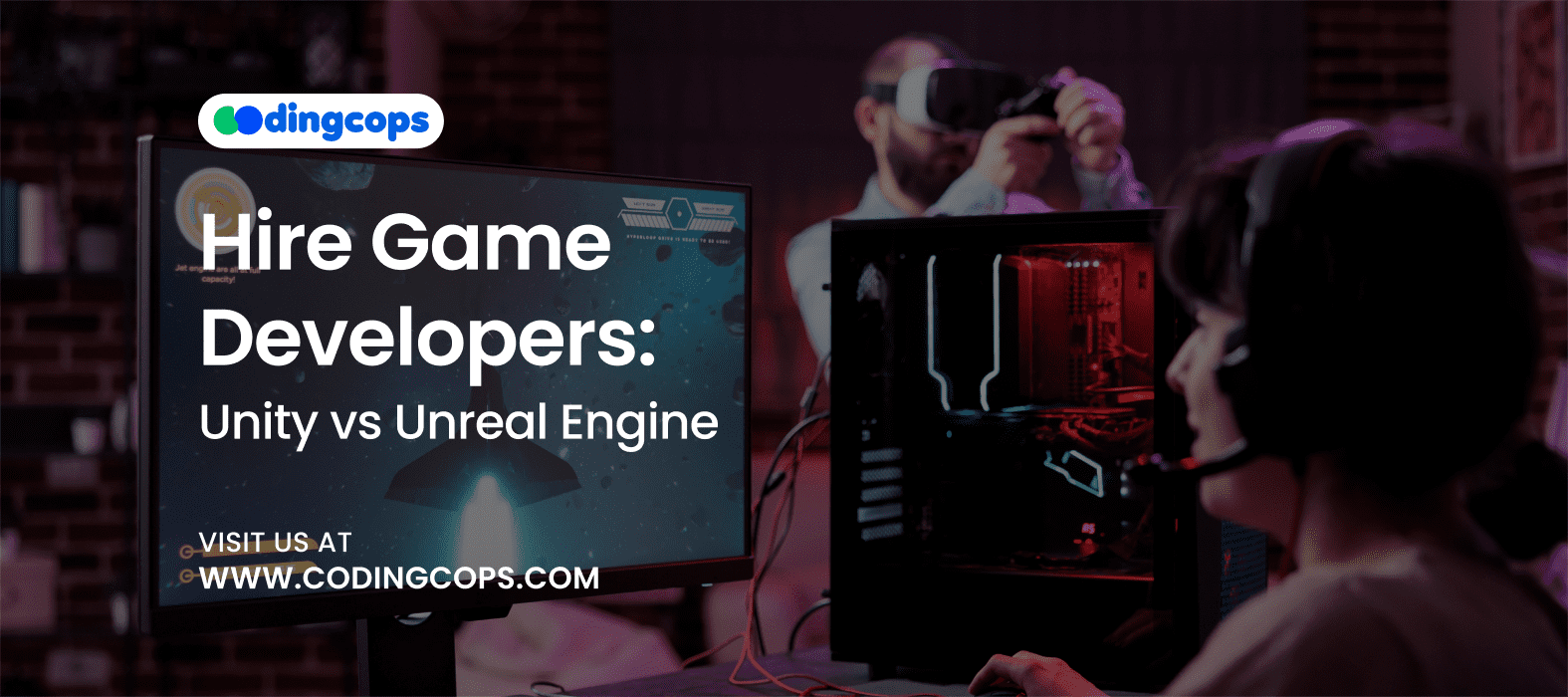Welcome to today’s blog on game development. Whether you are focusing on a side project or taking a chance to make game development the next big thing that will happen to your company, you are going to need to hire game developers who can innovate and be creative with your ideas.
Game development has transitioned from a pastime activity to a multibillion-dollar industry. As per the recent industry reports, the industry for game development is estimated to be $1.83 billion in 2025, but by the year 2030, these billions will reach $3.45 billion.
You might be thinking about how game development got this sheer popularity. This rise in popularity is owing to the pre-existence of smartphones and virtual reality headsets, along with the cloud gaming platforms, which made playing games without having a PC or console possible.
There are two game engines we are going to enlighten you on in this article, i.e., Unity and Unreal Engine. Both are popular game engines widely used to develop interactive games.
So, let’s start!
Game Development – A Brief Intro
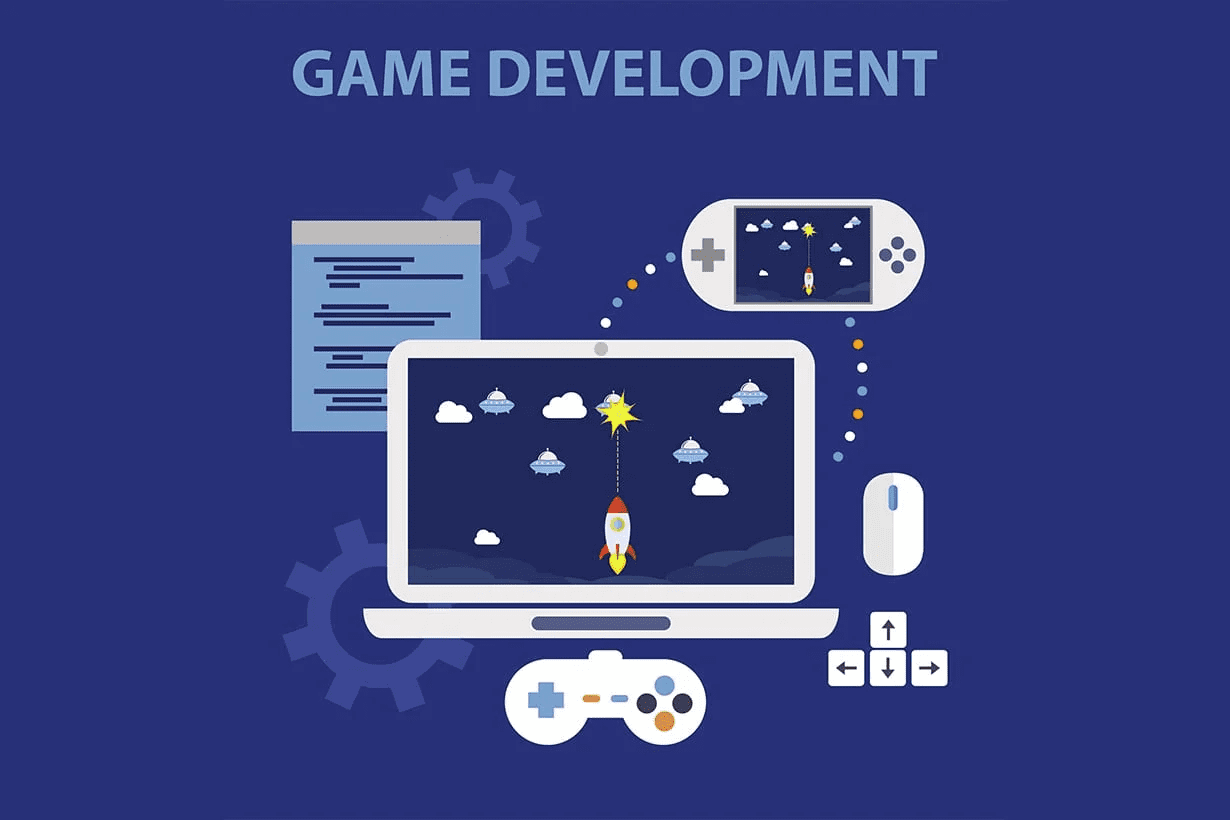
Software development is a broad field comprising many subfields, including game development. So briefly, game development is the process of building video games from the initial setup to the final release.
Game development itself is a multidisciplinary field involving the roles of various professionals such as programmers, UI/UX designers, VFX engineers, artists, writers, testers, and more. All these people come together to accomplish the goal of turning a game idea into a playable reality.
A game is developed using a game engine or a game development framework that provides developers with the tools and libraries needed to build a game efficiently. From many popular game engines, we will enlighten you about two of them, i.e., Unity and Unreal.
What is Unity?
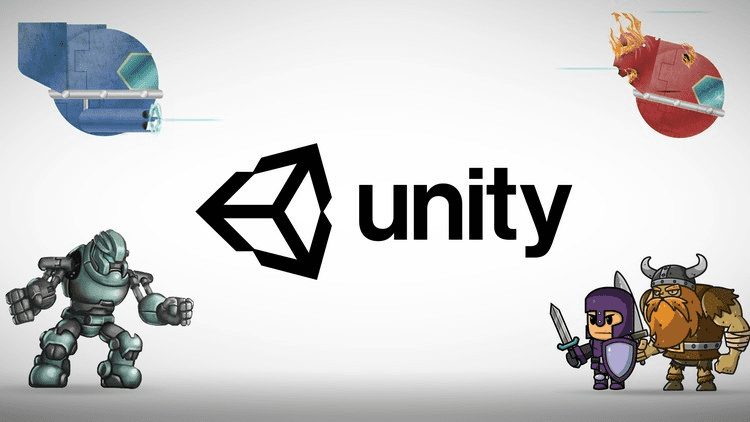
Unity is the first game engine that we will study. It is a cross-platform that is developed by Unity Technologies, but considered to be the most versatile game engine, which is very popular. Developers can create 2D, 3D, AR, and VR experiences on iOS, Android, Desktop, and WebGL platforms with the help of Unity.
Key Features of Unity
- Cross-Platform Development
Firstly, the core benefit of Unity is its cross-platform nature. Developers enjoy the liberty to easily deploy games to multiple platforms, including macOS, iOS, Android, Desktop, AR, and VR.
- 2D and 3D Development
Secondly, you do not need to be concerned about developing 2D and 3D games in different operating systems. It is quite easy to achieve such a goal with the use of Unity because it provides the tools for 2D & 3D game development.
- AR/VR Support
Moreover, it supports AR and VR environments, so you may develop applications with augmented reality and virtual reality.
- Unity uses C#
Unity uses C# as the primary scripting language. C# offers powerful scripting for implementing game logic, AI behaviors, and system interactions.
- Advanced Graphics Rendering
With Unity, you get the chance to utlize advanced graphics rendering for making your game more interactive and intuitive. It gives you real-time global illumination, HDR rendering, and physically based shading for visually exceptional 2D and 3D environments.
- Performance Optimization
Finally, Unity has profiling tools and optimization capabilities that are integrated into its framework and which contribute greatly to a smooth frame rate as well as guaranteed best performance on a variety of devices and platforms.
What is Unreal Engine?

The second game engine we are to discuss is Unreal. It is also a powerful and comprehensive 3D creation tool developed to create games, films, and other real-time applications. It develops applications that look highly realistic and have immersive interaction experiences.
Key Features of Unreal
- User Interface
Firstly, the user interface of Unreal Engine has a style that simplifies the workflow. It makes the screen space efficient, making it easier and faster to use. Moreover, there is a favoriting system in the details panel, allowing users to have quick access to the frequently used features. Further, the create button on the main tools eases the process of adding actors to the scene.
- Realistic Graphics
Secondly, the graphics provided by Unreal Engine are literally unreal. They produce photorealistic graphics, utilizing advanced rendering techniques and high-quality assets that help in creating visually stunning graphical environments.
- Built-in Physics Engine
Moreover, Unreal comes with a built-in physics engine that provides realistic simulations. This leads developers to create dynamic and interactive environments.
- Cross-platform Compatibility
Additionally, you get to witness cross-platform compatibility here in Unreal Engine, too. It supports a wide range of platforms, including desktops, consoles, mobile devices, and virtual reality. This means you can build games that run on various platforms and devices.
- Lumen
Lumen is a splendid feature of Unreal Engine, which is a fully dynamic global illumination and reflection system, designed for next-generation consoles. Moreover, it is the default global illumination and reflection system in UE5.
The role of Lumen is to diffuse reflection with detailed environments varying at different scales. It is capable of handling scales ranging from millimeters to kilometers.
- Nanite Virtualized Geometry
Nanite is a technology that is introduced in UE5. This technology enables the rendering of highly detailed environments with unlimited virtual geometric detail. Hence, allowing for more intricate and realistic scenes.
Unity vs. Unreal Engine – A Quick Comparison
| Aspects | Unity | Unreal Engine |
| Developed by | Unity Technologies | Expic Games |
| Written in | C# (Unity Scripting), C++ (runtime) | C++ |
| Cross-platform Compatibility | Yes | Yes |
| Ease of Use | Beginner-friendly interface | Difficult |
| Open Source | No | Yes |
| Community and Support | Large global community | Smaller community but highly professional. |
| Rendering | Sluggish | Quicker |
| Graphics Quality | Good | Excellent |
| Performance | Lightweight, good for mobile/web | Heavy but powerful, optimized for PC/console |
| Popular Games | Monument Valley, Crossy Road, Pokemon Go | Fortnite, PUBG, Hellblade, Gears of War |
Unity vs. Unreal Engine – Core Differences Explained
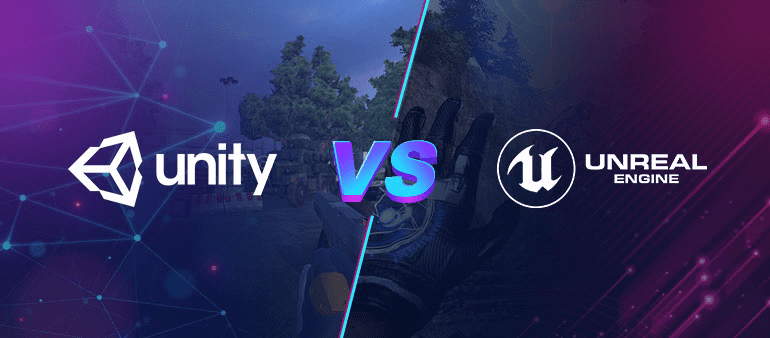
- Cross-platform Compatibility
Both platforms support cross-platform compatibility. Unity supports over 25 platforms, whereas Unreal Engine is nowhere near this number. However, it is to be noted that Unreal Engine is optimized for high-end platforms.
- Rendering
The rendering capabilities of Unity are somehow sluggish, which leads to delays in the project as well. On the other hand, the post-rendering in Unreal Engine is quicker, which makes it a better choice when it comes to rendering.
- Graphics Quality
Discussing the graphics quality, Unity provides a balance between graphics and performance, which means it can suit multiple projects and platforms. On the contrary, Unreal Engine is superior in coming through with high-quality levels of graphics, particularly for superior platforms.
- Performance
When it comes to performance, Unreal Engine takes the clear lead. It is built to furnish top-notch performance, high-end systems. While Unity is good at creating impressive FX, animation, and cinematics.
- Community & Support
Both Unity and Unreal Engine have strong and supportive communities, but they vary in their strengths. Unity possesses a very strong and vast community and support, whereas Unreal does not have a big community and support, but the developers working with Unreal are highly professional.
Which Engine Fits Your Needs?
When to Hire Unity Developers
You should opt to hire Unity developers:
- When you are building mobile games, especially having casual or hyper-casual titles.
- For AR/VR applications.
- For 2D or minimal 3D designs, such as puzzles, platformers, or educational games.
- When you want to launch an MVP.
- If you have a short budget and want to save operational costs.
When to Hire Unreal Engine Developers
Choose the option of hiring Unreal Engine developers:
- If you are building AAA games.
- When you prefer to have high-end VR simulations in your game.
- If photorealistic visuals are your preference.
- For building multiplayer online games.
How to Hire Game Developers
Hiring game developers is not just an important process, but a thoughtful one that requires your full attention and so you might be able to hire the right resources. Developers of games are decisively important in actualizing your game vision, irrespective of the nature of game being made.
Hence, the hiring process for game developers not only involves technical skill assessments but also the capability of understanding requirements, selecting the right game engine, and other critical aspects.
Hiring Models for Game Developers
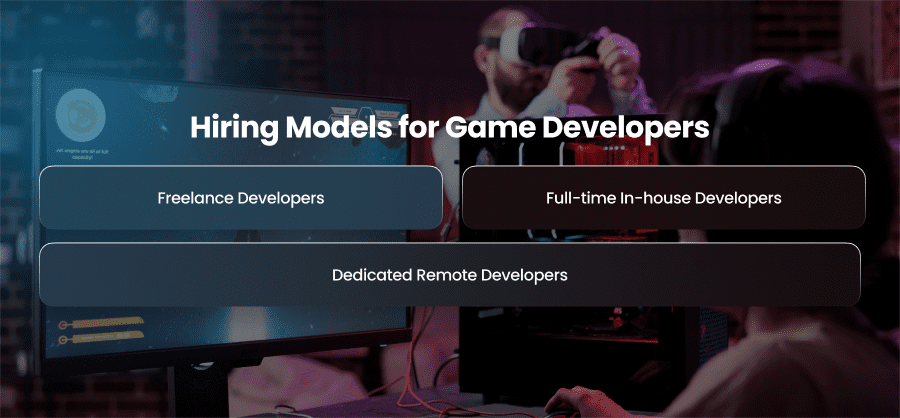
Three common types of hiring models are widely used for hiring game developers.
- Freelance Developers
- Full-time In-house Developers
- Dedicated Remote Developers
Freelance Game Developers
The first choice is to hire a freelance developer from an online freelance platform. You have to look for a game developer on a freelance platform who has the right expertise and experience to complete your project.
Such a hiring process is great for short-term tasks, prototyping, or testing. However, you must pay attention to their previous experience and portfolio. After complete satisfaction, proceed to hiring.
Full-time In-House Game Developers
Secondly, you can opt for in-house game developers. These developers work for you on a full-time basis and become a part of your organization.
It is an expensive option to have an in-house developer, but you won’t have any security or intellectual property issues with these developers. Moreover, they are suitable for long-term projects and are better for consistent communication and team integration.
Dedicated Remote Developers
Lastly, you have the choice of engaging with a developer from a different region or country. These developers cost you less compared to the previous choices and are highly qualified, too. All you have to do is search for the candidate around the world (from time zones that suit you).
These developers are like your in-house resources who work exclusively for you.
Step-by-Step Guide to Hiring Game Developers
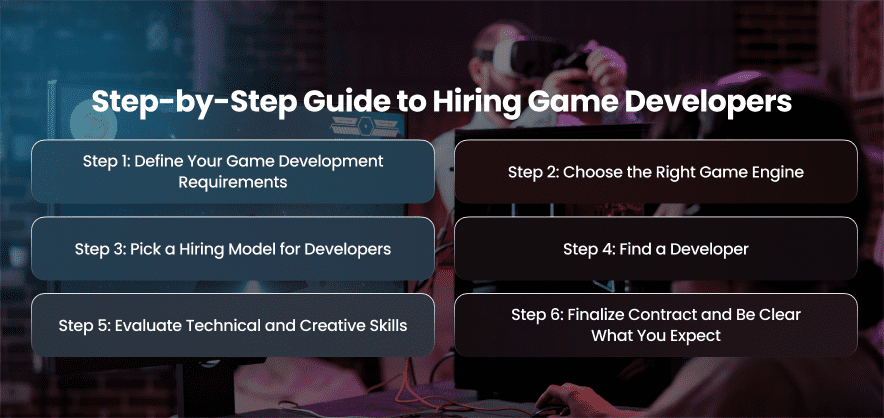
Step 1: Define Your Game Development Requirements
The first step holds sheer importance for your project to succeed. Before you start, you need to understand the following things:
- What sort of game are you looking for? Is it 2D, 3D, or a VR simulation?
- Choose the platform on which your game will be launched.
- Choose a technology stack for your game.
- Define your development requirements and scope.
- Analyze the number of developers you need for the project.
Step 2: Choose the Right Game Engine
Keeping in view the technical requirements of your game, choose a game engine that fits the technical and artistic requirements.
Step 3: Pick a Hiring Model for Developers
Now, pick up a hiring model according to your ease. If you are to develop a small-sized game, you can opt to hire a freelancer. However, in the case of high-end game development, you should go with an in-house or remote developer.
Step 4: Find a Developer
Based on your chosen hiring model, look for a game developer who has the potential to meet your expectations and fulfill project requirements.
Step 5: Evaluate Technical and Creative Skills
Once you finalize some developers for your project, you now have to asses their technical and creative skills. Look into their potential. Can they outperform your competitors?
Here are some things to do to evaluate the potential candidate:
- Look into their portfolio and previous projects.
- Ask technical questions related to C++, Unity, Unreal, and C#. Assess their knowledge of game loops, physics, and rendering pipelines.
- Do they have problem-solving skills? Look how they deal with bugs and platform-specific issues.
- Review their knowledge of user experience, integrating animations and effects.
Step 6: Finalize Contract and Be Clear What You Expect
Once you have finalized your developer, it’s time to finalize their contract. Offer them a handsome salary, sign NDAs and legally binding contracts, and be clear about your expectations and their roles.
Ending Notes
Since Unity and Unreal Engine are both used for game development, you can choose any for your project. However, the things to consider are the project complexity, graphical requirements, performance optimization, and community support.
If you are building a small-scale game with fewer performance requirements and high requirements for working with several platforms, you should consider Unity. Whereas if you want a high-end application that runs on PC/console with high graphics, Unreal Engine is for you.

